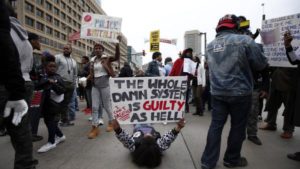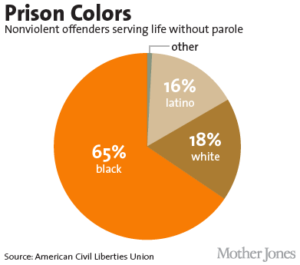
Among such issues were the militarization of police, racial profiling, poor funding for education, the disproportionate impact of the housing market crash on Black people and, perhaps one of the biggest issues of them all, mass incarceration.
As calm has finally returned to both cities and pressure was successfully placed on legislators to address the issues at the heart of such unrest, it seems Democrats and Republicans have finally found something they can agree on—the criminal justice system is in desperate need of reform.
“The whole idea of a young man dying in police custody, the confrontation with police, the looting and burning of innocent minority-owned business,” Texas Republican Sen. John Cornyn said earlier this month on the Senate floor, according to NPR. “The question arises, what can we do?”
Presidential candidates and prominent figures from both parties are now scrambling to answer that question.
It could very well be inspired by the rush to push one party ahead in the upcoming 2016 election, but one can only hope that recent events have finally sparked a genuine interest in resolving a problem that has disproportionately impacted for the Black community for so long.
Either way, talks of how to address the issue are finally making their way into the political arena with advocates from both parties eagerly pitching their own ideas on how to move forward.
Many democratic leaders, including the president himself, are leaning towards the type of overhaul that would prevent people from spending a lot of time behind bars for non-violent drug crimes. This approach would focus particularly on doing away with severe mandatory sentences that have placed some people in jail for decades for even the slightest drug-related infraction.
Republican officials, on the other hand, hope to keep the mandatory sentences in tact and focus on making it easier for offenders to earn credits that could drastically reduce their sentence. These options would be reserved, however, for low-risk inmates. Republicans also made it clear that they want to put together a commission to take a further look at issues surrounding mass incarceration and use their analysis to chart their way forward.
At first glance it seems like finding a solution to mass incarceration is yet another issue that has Congress split right down the middle, but legislators seem to be aware that there will be no cut and dry answer to such a problem.
Texas’ Republican Sen. Ted Cruz recently called for an end to “overcriminalization, harsh mandatory sentences, and the demise of jury trials,” in a book published back in April.
Solutions: American Leaders Speak Out on Criminal Justice Reform allowed many politicians from all different sides of the political arena express their own thoughts on what it would take to repair America’s flawed justice system.
Republican Sen. Marco Rubio’s proposal was to simplify the law in a way that makes it easier to follow and understand. Rubio insisted that “the average American now unknowingly commits three felonies a day” before he slammed that fact as “intolerable in a republic” because it “practically invites selective enforcement.”

“Our nation’s laws should focus on imprisoning the most dangerous and violent members of our society,” Paul explained. “Instead, our criminal justice system traps nonviolent offenders — disproportionately African-American men — in a cycle of poverty, unemployment, and incarceration. Our government’s administrative and regulatory laws have become so labyrinthine that not even our federal agencies, let alone our citizens, know exactly how many laws are on the books.”
When it comes down to it, this could very well be a case where everyone has a pretty good point but even then such proposals may not go deep enough.
“We have to think big right now,” Marc Mauer of the Sentencing Project told NPR. “Our sentencing policies have become so excessive that tinkering around the edges is not going to get us very far.”
Such proposals to reform the justice system are certainly taking steps in the right direction but Mauer believes that the changes need to be dramatic if legislators really hope to get Black and Latino citizens out of a racially biased trap that has thrown many of their communities into poverty.


